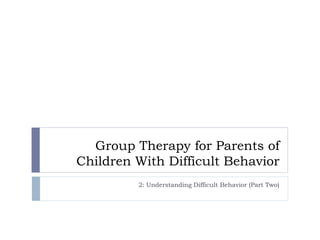This document provides an overview of group therapy for parents of children with difficult behavior. It discusses assumptions about the causes of behavioral problems and characteristics of inflexible/explosive children. The document reviews the Diagnostic and Statistical Manual (DSM) system for diagnosing psychiatric disorders. It presents a model for understanding the factors that influence misbehavior, including the child's characteristics, parenting style, family stress, and the parents' characteristics. The document also discusses establishing consequences for behavior using the ABC (antecedent, behavior, consequence) model and avoiding rewarding negative behavior. It provides homework and resources for further reading.
























